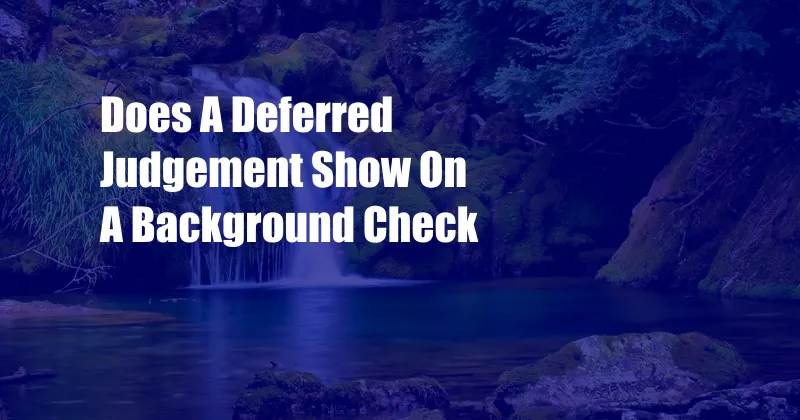
Does a Deferred Judgment Show on a Background Check?
I recently applied for a new job and was asked to undergo a background check. I have a deferred judgment on my record from a DUI arrest a few years ago. I’m not sure if this will show up on the background check and if it will affect my chances of getting the job.
In this article, we’ll take a closer look at what a deferred judgment is and whether or not it will show up on a background check. We’ll also discuss the potential consequences of having a deferred judgment and provide some tips on how to improve your chances of getting a job with a deferred judgment on your record.
What is a Deferred Judgment?
A deferred judgment is a type of plea agreement in which the defendant agrees to plead guilty or no contest to a crime, but the judge delays entering a formal judgment of conviction. Instead, the defendant is placed on probation for a period of time and ordered to complete certain conditions, such as attending counseling or performing community service.
If the defendant successfully completes the terms of their probation, the charges against them will be dismissed and they will not have a criminal conviction on their record. However, if the defendant violates the terms of their probation, the judge can enter a judgment of conviction and sentence them accordingly.
Will a Deferred Judgment Show on a Background Check?
Whether or not a deferred judgment will show up on a background check depends on the type of background check being conducted and the policies of the company or organization requesting the check.
Most standard background checks will only reveal criminal convictions. Since a deferred judgment is not a conviction, it will not typically show up on a standard background check. However, if the background check is being conducted for a job that requires a high level of security or trust, the employer may request a more thorough background check that includes deferred judgments.
Consequences of a Deferred Judgment
Even though a deferred judgment is not a conviction, it can still have some negative consequences.
- Employment: As mentioned above, a deferred judgment may show up on a background check for certain types of jobs. This could make it difficult to get a job in fields such as law enforcement, healthcare, or finance.
- Housing: Some landlords may also consider a deferred judgment when screening potential tenants. This could make it difficult to find housing, especially in competitive rental markets.
- Travel: A deferred judgment may also affect your ability to travel to certain countries. For example, Canada denies entry to individuals with certain types of criminal records, including deferred judgments.
Tips for Improving Your Chances of Getting a Job with a Deferred Judgment
If you have a deferred judgment on your record, there are still things you can do to improve your chances of getting a job.
- Be honest about your deferred judgment: When applying for a job, be honest about your deferred judgment on your application. Don’t try to hide it, as this could come back to haunt you later. In your cover letter or resume, you can briefly explain the circumstances surrounding your deferred judgment and emphasize the steps you have taken to improve your life since then.
- Highlight your positive qualities: In your job applications, focus on your positive qualities and skills. Emphasize your work ethic, your dedication to your job, and your commitment to your community. Show the employer that you are a valuable asset and that you deserve to be given a chance despite your past mistake.
- Network with people in your field: Networking can be a great way to find job opportunities that are not advertised. Reach out to people in your field and let them know that you are looking for a job. They may be able to connect you with potential employers who are willing to overlook your deferred judgment.
FAQs About Deferred Judgments and Background Checks
Q: Will a deferred judgment show up on a criminal background check?
A: No, a deferred judgment will not typically show up on a standard criminal background check. However, it may show up on a more thorough background check, such as one conducted for a job that requires a high level of security or trust.
Q: Can I get a job with a deferred judgment on my record?
A: Yes, it is possible to get a job with a deferred judgment on your record. However, it may be more difficult to find a job in certain fields, such as law enforcement, healthcare, or finance. You may also need to be more proactive in your job search and be prepared to address your deferred judgment in your applications.
Q: How can I improve my chances of getting a job with a deferred judgment on my record?
A: There are a few things you can do to improve your chances of getting a job with a deferred judgment on your record. First, be honest about your deferred judgment on your application. Second, highlight your positive qualities and skills in your applications. Third, network with people in your field.
Conclusion
A deferred judgment is not a conviction, but it can still have some negative consequences. If you have a deferred judgment on your record, it is important to be aware of the potential consequences and to take steps to mitigate them. By being honest about your deferred judgment, highlighting your positive qualities, and networking with people in your field, you can improve your chances of getting a job and moving on with your life.
Are you interested in learning more about deferred judgments and background checks? Leave a comment below and let us know your thoughts.